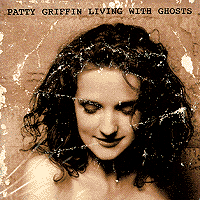 I had cause this week to write an essay about the theatrical structure of Patty Griffin's songs. I'd like to share it here, since she's one of my favorite artists.
I had cause this week to write an essay about the theatrical structure of Patty Griffin's songs. I'd like to share it here, since she's one of my favorite artists. Thoughts on Patty Griffin (November 29, 2006)
By MARK BLANKENSHIP
If you met the people in Patty Griffin's songs, you might never remember them. They might hand you your change or shuffle past you in the rain, and their quiet faces would hide the fact that they're burning alive. Because even though they're plain—-factory workers, widowers, farmers—-these men and women endure things they can barely describe. In song after song, Griffin uses her voice and her lyrics to unleash the pain of those who have no practice expressing themselves. Even when the music stays quiet, we're almost always given the sense of a dam finally breaking. And that flood of emotion is what makes listening to Patty Griffin's music, as sad as it is, so exhilarating.
That paradox is present even in the sound of her voice. Capable of everything from high, soft crooning to throaty wails, it is an instrument that demands admiration. But the glorious technical ability is rocked by tremors of sadness in her voice. There's a rough edge on every note that warns she's about to be overcome. This graveled rasp means she will never sound absolutely pure, but she will always sound alive.

Perhaps because she understands her sound so well, Griffin regularly matches her voice with bittersweet words. Taken together, her songs cohere into a sweeping story of loneliness and loss that only occasionally gets conquered. With each song, she finds a new facet of sadness.
More importantly, she finds a new story to tell.
There are three rough categories for Patty Griffin's stories. Not all of them involve the lonely people described above, but they all add contours to the world those people inhabit. Generally, the categories are:
(1) first person narratives in which Griffin might be singing about herself,
(2) third person narratives in which she sings about other people, and
(3) first person narratives in which she has obviously taken on another persona.
All three give a particular insight into Griffin's inherently dramatic technique.
Songs in the first category ("possibly Patty") are often addressed to someone specific, as though Griffin were creating a two-person scene. And because they have a clear dramatic intention, the words are never vague. In "We Are Water," Patty (let's call her Patty for now) wants to keep a friend from leaving, so she's finally describing all the things she's felt for him or her. At first, her reasoning sounds controlled. "My friend, my friend you are traveling," she explains, "and some of these secrets are unraveling… I got no regrets, baby, I got no shame."
But it's easy to imagine her friend still heading out the door, because as the song progresses, she gets more and more desperate to keep herself from being left behind. The tempo increases. Her vocals get louder and higher. And the vocals take her plea's central metaphor—-that she and her friend are water, flowing into one another—-to a nakedly needy place. "Sometimes, I think I'll drown in all these things that I feel," she exclaims. And finally, as though even that hasn't worked, she reveals the heart of her dread:
Out on the beach today, I did not find
One single footstep we had left behind
So I went out swimming in the deep blue sea
And felt the water wash over me
The hard, hard fear. The footprints these two have made together—-the vital moments of their relationship—-could get washed away forever by distance and time. Their connecton, so valuable now, could get swallowed in the anonymous ocean. No wonder a popular bootleg of the song—-it has never officially been released—-ends with Patty's wild vocal riffs. How do you make anything but raw, animal sound after exposing yourself so completely?

In contrast, Griffin's third-person songs tend to be her most restrained. She takes us to the edge of someone's pain and leaves us there, describing it just enough to let us feel the rest of the ache for ourselves. Her sense of dramatic arc, however, remains strong. Consider how much we learn about the heroine of "Sweet Lorraine," who appears on the album "Living With Ghosts." This is a woman who has been fighting for years to escape a legacy of hatred and cruelty in her family. In a few phrases, Griffin lets us know she's the kind of reckless woman who will "say outlandish things to her family just to scare (them)" and who will do anything to keep her life going forward. She starts businesses that fail. She goes to school. She gets married.
But it's not dramatic simply to run. Griffin shows us exactly what Lorraine is running from. She tells us that Lorraine's "father called her a slut and a whore on the night before her wedding day," and she says the poor girl's "mother threw stones at her on the day that she moved." It's easy to paint the rest of Lorraine's picture ourselves.
Blending these two perspectives, Griffin's third style of song may be her most definitive. With remarkable clarity, she puts herself into the lives of other people—-men and women; young and old; present day and living decades ago—-and gives them a first person voice to excavate their deepest misery.

In "Making Pies," we meet an elderly woman who has been working at a Table Talk pie factory for decades, trying to distract herself through church work and family gatherings from the memory of a husband killed in "the war." Griffin sums up the woman's mindset in the following phrases:
It's not far. I can walk
Down the block to Table Talk.
Close my eyes, make the pies all day.
Plastic cap on my hair
Used to mind, now I don't care.
Used to mind, now I don't care, 'cause I'm gray.
This woman can admit with rueful humor that she has started to change while her world has remained still. She's been making the same old pies for years, but now she doesn't even fight the indignity of factory labor. It's up to us whether to interpret this as gentle acceptance or total defeat.
In "Long Ride Home," there's no doubting how the character feels. He's a man whose wife has died, and he fears his lack of affection may have killed her. Sitting alone in the limousine on the ride back from her funeral, he berates himself, "Forty years go by of someone laying in your bed. Forty years of things you say you wish you'd never said. How hard would it have been to say some kinder words instead? I wonder as I stare out at the sky a'turnin' red."
Like "Making Pies," the song is a complete drama. We know where this man is located. We know precisely his conflict. From his use of the word "a'turnin'" we even can guess that he's Southern.
In both songs, Griffin lets the final section explode with the same emotional passion of "We Are Water." The woman in "Pies" finally cries in high-pitched misery about how routine life has not erased the memory of her husband. In "Long Ride," the man sings loud and low with agony as he realizes that he's pulling up to his house. "It seems as empty as the inside of me," he moans.
But it's too late. These feelings have been kept inside for too long. In all Griffin's character songs, these everyday men and women must carry their broken hearts around forever. It's no accident that these characters are almost always talking to themselves. In a way, Griffin is giving voice only to what's inside of them. There's never any indication that the feelings she's evoking will actually be expressed out loud by the characters. Instead, there are signs that these people will continue with their anonymous, lonely lives. At the end of "Making Pies," the woman heads back to the factory for another shift. And what choice does the man have but to get out of the limo and head inside the empty house?
It's a great irony that Griffin sings so expressively about feelings that are still buried in the people feeling them. It's like she's calling up from the most private parts of their souls, trying to release something that could potentially stay muted forever.
That struggle is devastating and gorgeous to hear.
Labels: Country/Folk

















